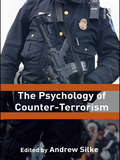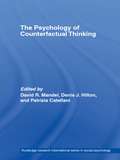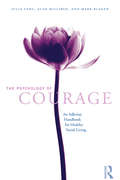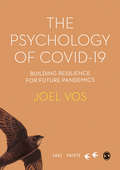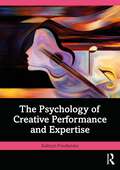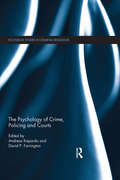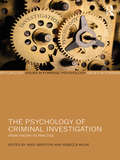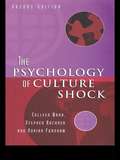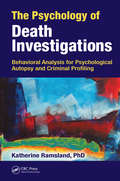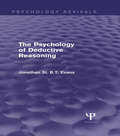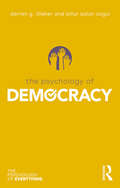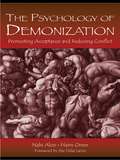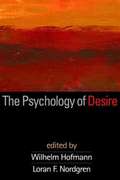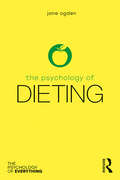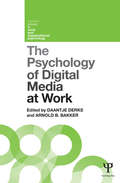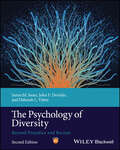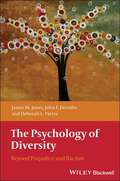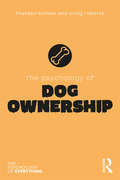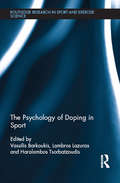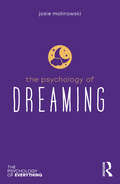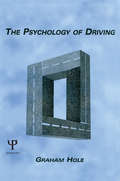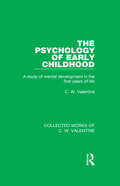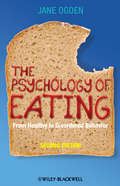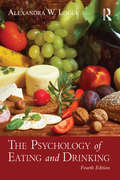- Table View
- List View
The Psychology of Counter-Terrorism (Political Violence)
by Andrew SilkeThis edited book explores how psychology can be used to improve our understanding of terrorism and counterterrorism. This work firstly aims to provide balanced and objective insight into the psychology of terrorists; what their motivations are, what keeps them involved in terrorist groups, and what eventually forces most to end their active involvement in terrorism. Secondly, the contributors focus on the challenging issue of how to respond to terrorism. These chapters provide information for those concerned with short-term tactical problems (e.g. interviewing), as well as those looking towards the more long-term strategic questions of bringing an entire terrorist campaign to an end. Ultimately, the individuals involved in terrorism require a more complex response from society than simply a quest for their apprehension. Believing inaccurate and misleading characterizations leads inevitably to damaging policies and deficient outcomes and campaigns of violence are needlessly prolonged. It is from this perspective that the concern arises with how researchers – and the policy makers guided by them – perceive the psychology of terrorists and of terrorism. This innovative book will be of great interest to students of terrorism and counter-terrorism, security studies, psychology and politics, as well as security professionals and military colleges.
The Psychology of Counterfactual Thinking (Routledge Research International Series in Social Psychology)
by David R. Mandel Denis J. Hilton Patrizia CatellaniThis book provides a critical overview of significant developments in research and theory on counterfactual thinking that have emerged in recent years and spotlights exciting new directions for future research in this area. Key issues considered include the relations between counterfactual and casual reasoning, the functional bases of counterfactual thinking, the role of counterfactual thinking in the experience of emotion and the importance of counterfactual thinking in the context of crime and justice.
The Psychology of Courage: An Adlerian Handbook for Healthy Social Living
by Julia Yang Alan MillirenCourage refers to the willingness for risk taking and to move ahead in the presence of difficulties. The purpose of this book is to present courage as the main foundation of understanding and training for mental health in the three life task areas described by Adler: Work, Love, and Friendship. It explores the meaning of each life task and problems of fear, compensation, or evasion, as well as Adlerian insight on socially useful attitudes of approaching the task under discussion. Socratic dialog boxes are included throughout each chapter to encourage the interactivity between the text and readers’ thought processes. Also included is a set of twenty-two helping tools that were creatively designed for self-exercise or to be used to help others uncover or acquire courage. For those in the helping professions, this text will be a unique and valuable handbook for not only working with and helping their clients, but also for their own personal development.
The Psychology of Covid-19: Building Resilience for Future Pandemics (SAGE Swifts)
by Joel VosThe Psychology of Covid-19 explores how the coronavirus is giving rise to a new order in our personal lives, societies and politics. Rooted in systematic research on Covid-19 and previous pandemics, including SARS, Ebola, HIV and the Spanish Flu, this book describes how Covid-19 has impacted a broad range of domains, including self-perception, lifestyle, politics, mental health, media, and meaning in life. Building on this, the book then sets out how we can improve our psychological and social resilience, to safeguard ourselves against the psychological effects of future pandemics.
The Psychology of Covid-19: Building Resilience for Future Pandemics (SAGE Swifts)
by Joel VosThe Psychology of Covid-19 explores how the coronavirus is giving rise to a new order in our personal lives, societies and politics. Rooted in systematic research on Covid-19 and previous pandemics, including SARS, Ebola, HIV and the Spanish Flu, this book describes how Covid-19 has impacted a broad range of domains, including self-perception, lifestyle, politics, mental health, media, and meaning in life. Building on this, the book then sets out how we can improve our psychological and social resilience, to safeguard ourselves against the psychological effects of future pandemics.
The Psychology of Creative Performance and Expertise
by Kathryn FriedlanderThis much-needed book introduces readers to the related fields of expertise, creativity, and performance, exploring our understanding of the factors contributing to greatness in creative domains.Bringing together research from the fields of creativity and expertise, it provides fresh insights for newcomers and seasoned scholars alike with its approachable guide to the multidimensional complexities of expertise development. It transcends traditionally studied fields such as chess, sports, and music, instead exploring the intersection of expertise with creativity and the performing arts. Dedicated applied chapters cover eight fields, including mind-games, music, dance, creative writing, acting, art, and STEM. The book also examines the facilitators of creative performance, including aesthetic sensitivity, creativity, and mental imagery, as well as the obstacles to performance, such as burnout, procrastination, and gender-related challenges. The book concludes by engaging with pressing issues facing expertise, including the impact of AI. Student-friendly pedagogy is featured throughout, including 'Spotlight on...', 'Check it out...', and 'Consider this...' boxes to position material within context and engage students' learning.Whether revealing how an actor brings their part to life, how writers conjure up their storylines and vibrant characters, or what lies behind scientific invention, The Psychology of Creative Performance and Expertise offers a fascinating insight into the multifaceted journey towards achieving creative excellence. This is a valuable resource for final-year undergraduate and postgraduate students, and scholars across a range of disciplines, including expertise or skill acquisition, the psychology of performance, and creativity.
The Psychology of Crime, Policing and Courts (Routledge Studies in Criminal Behaviour)
by David P. Farrington Andreas KapardisThis book brings together an international group of experts to present cutting-edge psychological research on crime, policing and courts. With contributors from the UK, Germany, Italy, Norway, Cyprus, Israel, Canada and the USA, this volume explores some of the most interesting and contemporary areas of criminological and legal psychology. The Psychology of Crime, Policing and Courts is divided into three parts. Part I explores crime and anti-social behaviour, including the concentration of offending within families, juvenile delinquency, adolescent bullying, cyberbullying, violence risk assessment, and psychopathy. Part II examines policing and the detection of deception, with chapters on interrogational practices, police interviews of children, and modern detection methods. Part III focuses on courts and sentencing, with chapters exploring wrongful convictions, the role of juries, extra-legal factors in sentencing decisions and an examination of sentencing itself. Representing the forefront of research in developmental criminology and criminological and legal psychology, this book is a comprehensive resource for undergraduate and postgraduate students studying psychology and criminology, with particular value for those studying forensic psychology. This book is also a valuable resource for psychologists, lawyers, social scientists and law enforcement personnel.
The Psychology of Criminal Investigation: From Theory to Practice
by Andy Griffiths Rebecca MilneThe contribution of psychological research to the prevention of miscarriages of justice and the development of effective investigative techniques is now established to a point where law enforcement agencies in numerous countries either employ psychologists as part of their staff, or work in cooperation with academic institutions. The application of psychology to investigation is particularly effective when academics and practitioners work together. This book brings together leading experts to discuss the application of psychology to criminal investigation. This book offers an overview of models of investigation from a psychological and practical view point, covering topics such as investigative decision making, the presentation of evidence, witness testimony, the detection of deception, interviewing suspects and evidence-based police training. It is essential reading for students, researchers and practitioners engaged with police practice, investigation and forensic psychology.
The Psychology of Culture Shock
by Stephen Bochner Adrian Furnham Colleen WardCrossing cultures can be a stimulating and rewarding adventure. It can also be a stressful and bewildering experience. This thoroughly revised and updated edition of Furnham and Bochner's classic Culture Shock (1986) examines the psychological and social processes involved in intercultural contact, including learning new culture specific skills, managing stress and coping with an unfamiliar environment, changing cultural identities and enhancing intergroup relations.The book describes the ABCs of intercultural encounters, highlighting Effective, Behavioural and Cognitive components of cross-cultural experience. It incorporates both theoretical and applied perspectives on culture shock and a comprehensive review of empirical research on a variety of cross-cultural travellers, such as tourists, students, business travellers, immigrants and refugees. Minimising the adverse effects of culture shock, facilitating positive msychological outcomes and discussion of selection and training techniques for living and working abroad represent some of the practical issues covered.The Psychology of Culture Shock will provide an essential reference and textbook for courses within psychology, sociology and business training. It will also be a valuable resource for professionals working with culturally diverse populations and acculturating groups such as international students immigrants or refugees.
The Psychology of Death Investigations: Behavioral Analysis for Psychological Autopsy and Criminal Profiling
by Katherine RamslandThe Psychology of Death Investigations outlines definitively how behavioral evidence can often provide the necessary components and "missing pieces" to complement physical evidence as an essential tool for incident reconstruction. In order to determine the direction of an investigation and to prioritize leads, if necessary, death investigators must establish the manner of a death: natural, accident, homicide or suicide. The most overlooked aspect of death investigation is the psychological dimension, which can provide unique leads, correct false assumptions, enhance investigative awareness, and solve cases in surprising ways. In an estimated 10–20% of cases, the manner of death cannot be determined, or worse, has been erroneously categorized. Since many jurisdictions can’t afford behavioral consultants, this book has been written to provide practical information for a basic psychological analysis. If the circumstances surrounding a death are equivocal, psychological consultants can compile information retrospectively about a deceased person’s mental state and possible motive to assist with unravelling ambiguity about the manner of death. This is the primary function of a psychological autopsy, and, as such, this is the first book of its kind dedicated solely to the topic. In the event that the manner of death is determined to be a homicide, behavioral profiling can help to focus the potential pool of suspects. Professionals and students alike will benefit from the exercise of cognitive awareness and the application of psychological logic presented. Psychologists, medical examiners, coroners, attorneys, fraud examiners, law enforcement personnel, death and homicide investigators, and students enrolled in criminal profiling, forensic psychology, and criminal justice programs will find this text to be a compelling and insightful reference to add to their professional toolkit.
The Psychology of Deductive Reasoning (Psychology Revivals)
by Jonathan St. EvansOriginally published in 1982, this was an extensive and up-to-date review of research into the psychology of deductive reasoning, Jonathan Evans presents an alternative theoretical framework to the rationalist approach which had dominated much of the published work in this field at the time. The review falls into three sections. The first is concerned with elementary reasoning tasks, in which response latency is the prime measure of interest. The second and third sections are concerned with syllogistic and propositional reasoning respectively, in which interest has focused on the explanation of frequently observed logical errors. In an extended discussion it is argued that reasoning processes are content specific, and give little indication of the operation of any underlying system of logical competence. Finally, a dual process theory of reasoning, with broad implications and connections with other fields of psychology, is elaborated and assessed in the light of recent evidence.
The Psychology of Democracy (The Psychology of Everything)
by Darren G. Lilleker Billur Aslan OzgulWhat is a democracy? Why do we form democratic systems? Can democracy survive in an age of distrust and polarisation? The Psychology of Democracy explains the psychological underpinnings behind why people engage with and participate in politics. Covering the influence that political campaigns and media play, the book analyses topical and real-world political events including the Arab Spring, Brexit, Black Lives Matter, the US 2020 elections and the Covidd-19 pandemic. Lilleker and Ozgul take the reader on a journey to explore the cognitive processes at play when engaging with a political news item all the way through to taking to the streets to protest government policy and action. In an age of post-truth and populism, The Psychology of Democracy shows us how a strong and healthy democracy depends upon the feelings and emotions of its citizens, including trust, belonging, empowerment and representation, as much as on electoral processes.
The Psychology of Demonization: Promoting Acceptance and Reducing Conflict
by Haim Omer Nahi AlonThroughout human history, the relationships of individuals and groups have been disrupted by what the authors sum up as "demonization," the attribution of basic destructive qualities to the other or to forces within the self. Demonization results in constant suspicion and blame, a systematic disregard of positive events, pressure to eradicate the putative negative persons or forces, and a growing readiness to engage in escalating conflict. Richly illustrated with 24 case stories, this book explores the psychological processes involved in demonization and their implications for the effort to effect change in relationships, psychotherapy, and beyond the office or clinic in the daily lives of families, organizations, and societies.Recent popular psychology--the authors argue--has tended to encourage demonization. An appropriate alternative to this view is known as the "tragic view": Suffering is inevitable in life; negative outcomes are a result of a confluence of factors over which one has only a very limited control; there is no possibility of reading into the hidden "demonic" layers of the other's mind; the other's actions, like our own, are multiply motivated; escalation is a tragic development rather than the result of an evil "master plan"; and finally, skills for promoting acceptance and reducing escalation are necessary for diminishing interpersonal suffering. The authors describe and illustrate a series of these skills both for psychotherapy and for personal use. Finally, they lay out an approach to consolation and acceptance, the neglect of which they attribute to the dominance of demonic views.The Psychology of Demonization: Promoting Acceptance and Reducing Conflict will be appreciated by all those professionally and personally concerned with the state of relationships.
The Psychology of Desire
by Loran F. Nordgren Wilhelm HofmannProviding a comprehensive perspective on human desire, this volume brings together leading experts from multiple psychological subdisciplines. It addresses such key questions as how desires of different kinds emerge, how they influence judgment and decision making, and how problematic desires can be effectively controlled. Current research is reviewed on underlying brain mechanisms and regulatory processes. Cutting-edge measurement tools are described, including practical recommendations for their use. The book also examines pathological forms of desire and the complex relationship between desire and happiness. The concluding section analyzes specific applied domains--eating, sex, aggression, substance use, shopping, and social media.
The Psychology of Dieting (The Psychology of Everything)
by Jane OgdenWhy do some of us become overweight? Why is it so difficult to lose weight? How can we adopt healthy attitudes towards food? The Psychology of Dieting takes a broad and balanced view of the causes of weight gain and the challenges involved in dieting. Exploring the cognitive, emotional and social triggers which lead us to make poor decisions around food, the book considers what it means to diet well. By understanding our psychological selves, the book shows how we can change our unhealthy behaviours and potentially lose weight. In an era of weight problems, obesity, and dangerous dieting, The Psychology of Dieting shows us that there is no such thing as a miracle diet, and that we must understand how our minds shape the food choices we make.
The Psychology of Digital Media at Work
by Arnold B. Bakker Daantje DerksIn many professions daily work life has become unthinkable without the use of a computer with access to the Internet. As technological innovations progress rapidly and new applications of interactional media are invented, organizational behaviour continues to change. The central theme of this book is how new media affect organizational behavior and employee well-being. A variety of topics are considered: applications of new media in both personnel psychology and organizational psychology tools to improve selection and assessment issues arising in the context of training, learning and career development the use of online games for education and recreation the impact of mobile devices on organizational life the implications of new forms of collaboration by means of virtual teams. The research documented in this volume consists of high quality, quantitative studies illustrated by lively practical examples. The combination of science and practice ensures that new insights supported by empirical studies are translated into practical implications. The book will be essential reading for researchers and students in organizational psychology and related disciplines.
The Psychology of Diversity: Beyond Prejudice and Racism
by James M. Jones Deborah L. Vietze John F. DovidioExamines the barriers and benefits of diversity, offering a comprehensive framework for addressing systemic inequities and enhancing intergroup relations The Psychology of Diversity: Beyond Prejudice and Racism provides a thorough exploration of how diversity influences individual and societal behavior. Now in its second edition, this fully revised textbook addresses the evolving challenges and opportunities of diversity in a world shaped by rapid demographic shifts, rising polarization, and the intensifying need for equity and inclusion. Integrating rigorous research, historical context, and actionable insights, the authors illuminate how understanding and embracing diversity can foster stronger communities and institutions. Updated and expanded content responds to the evolving challenges of the past decade, such as rising political polarization, increasing resistance to equity initiatives, and the escalating diversity divide, while highlighting new opportunities for inclusion and mutual understanding. Entirely new chapters address health disparities, racial bias in policing, debates over affirmative action and Critical Race Theory, the historical and systemic roots of diversity challenges, and other contemporary issues. Featuring timely coverage of diversity's complexities in the face of unprecedented societal changes, Psychology of Diversity: Beyond Prejudice and Racism: Explores diversity through psychological, historical, cultural, and institutional lenses while highlighting its broader societal impacts Provides evidence-based strategies and best practices for fostering inclusion, reducing bias, and building stronger intergroup relations Incorporates empirical research and case studies reflecting the latest findings in psychology, sociology, and neuroscience Contains new content on gender diversity, nonbinary identities, sexual orientation, and immigration as key diversity challenges and opportunities Integrates practical scenarios to illustrate key concepts and their application in everyday life Includes a wealth of teaching and learning tools and an online instructor's manual to support both independent study and classroom use The Psychology of Diversity: Beyond Prejudice and Racism, Second Edition, is an excellent textbook for advanced undergraduate and graduate courses on social psychology, prejudice, intergroup relations, and multiculturalism. It is also a valuable reference for professionals working to address equity challenges in fields such as education, healthcare, public policy, and organizational leadership.
The Psychology of Diversity: Beyond Prejudice and Racism (Coursesmart Ser.)
by James M. Jones Deborah L. Vietze John F. DovidioThe Psychology of Diversity presents a captivating social-psychological study of diversity, the obstacles confronting it, and the benefits it provides. Goes beyond prejudice and discrimination to discuss the personal and social implications of diversity for both majority and minority group members Considers how historical, political, economic, and societal factors shape the way people think about and respond to diversity Explains why discrimination leads to bias at all levels in society – interpersonal, institutional, cultural, and social Describes proven techniques for improving intergroup relations Examines the brain's impact on bias in clear terms for students with little or no background in neuroscience Includes helpful study tools throughout the text as well as an online instructor’s manual
The Psychology of Dog Ownership (The Psychology of Everything)
by Craig Roberts Theresa BarlowWhat are the benefits of owning a dog on health and well-being? Why does a problem dog behave as it does and how can owners deal with unwanted behaviour? How do dogs communicate with humans and each other? The Psychology of Dog Ownership explores the nature of our unique relationship with dogs and its effect on our mental and physical welfare. The book uses psychological learning theory to examine dog behaviour and highlights the importance of determining between typical dog behaviour and behaviour disorders that need treatment. Focusing on how dog owners can communicate effectively with their pets, and always with the dogsbest interests in mind, The Psychology of Dog Ownership enhances our understanding of the modern human-canine bond and shows how important and enjoyable this relationship can be.
The Psychology of Doping in Sport (Routledge Research in Sport and Exercise Science)
by Vassilis Barkoukis Lambros Lazuras Haralambos TsorbatzoudisThis is the first book to draw together cutting-edge research on the psychological processes underlying doping use in sport and exercise, thereby filling an important gap in our understanding of this centrally important issue in contemporary sport. Covering diverse areas of psychology such as social cognition, automatic and controlled processes, moral decision-making, and societal and contextual influence on behaviour, the book also explores methodological considerations surrounding doping assessment in psychological research as well as future directions for evidence-based preventive interventions and anti-doping education. Written by a team of leading international researchers from countries including the US, Canada, Australia, the UK, Greece, Germany, Italy, Denmark and Ireland, the book integrates empirical findings with theoretical guidance for future psychological research on doping, and illuminates the challenges, needs and priorities in contemporary doping prevention. It is important reading for advanced students and researchers in sport and exercise science, sport management and sport policy, and will open up new perspectives for professional coaches, sports administrators, policy makers and sport medicine specialists looking to better understand the doping behaviours of athletes in sport.
The Psychology of Dreaming (The Psychology of Everything)
by Josie MalinowskiWhy do we dream? What is the connection between our dreams and our mental health? Can we teach ourselves to have lucid dreams? The Psychology of Dreaming delves into the last 100 years of dream research to provide a thought-provoking introduction to what happens in our minds when we sleep. It looks at the role that dreaming plays in memory, problem-solving, and processing emotions, examines how trauma affects dreaming, and explores how we can use our dreams to understand ourselves better. Exploring extraordinary experiences like lucid dreaming, precognitive dreams, and sleep paralysis nightmares, alongside cutting-edge questions like whether it will ever be possible for androids to dream, The Psychology of Dreaming reveals some of the most fascinating aspects of our dreaming world.
The Psychology of Driving (The\psychology Of Everything Ser.)
by Graham J. HoleRoad accidents are the major cause of death and injury among young people in the developing world, and the field of psychology can offer great insights into the many factors that are at play when we get behind the wheels of our cars. Based on data collected around the world on drivers of all age groups, Graham Hole provides an up to date picture of the realities of driving, including visual perception issues, cell phone distractions, fatigue, drugs, and the effects of aging. These insights can help explain why we crash, as well as how we achieve the amazing feat of not crashing more often than we do. In this jargon-free and very accessible book, Hole applies psychological methods and insights to this every-day experience with two audiences in mind. First, he speaks to accident investigators, who frequently rely on well-developed understandings of engineering and forensics and less insight into the psychology of the driver. Second, of course, this book will be of value to anyone interested in the application of cognitive psychology to real-world behaviors, and to anyone who drives.
The Psychology of Early Childhood: A Study of Mental Development in the First Years of Life (Collected Works of C.W. Valentine)
by C.W. ValentineOriginally published in 1942, this title attempted to trace, from their very earliest appearances after birth, all aspects of mental development in childhood up to the age of about 4 or 5. It is based largely on the author’s almost daily observations of his own five children, over a period of some twenty years, supplemented by numerous tests and experiments. The first purpose of this book was to advance our knowledge of the psychology of childhood. The importance of such knowledge had become increasingly recognised. Even if not all is completely determined in the first 4-5 years, there was little doubt by this time that these first years are of profound significance for future development: and the better understanding and training of the young child may be at the root of many of our educational and social problems.
The Psychology of Eating
by Jane OgdenWith its primary focus on the psychology of eating from a social, health, and clinical perspective, the second edition of The Psychology of Eating: From Healthy to Disordered Behavior presents an overview of the latest research into a wide range of eating-related behaviors Features the most up-to-date research relating to eating behavior Integrates psychological knowledge with several other disciplines Written in a lively, accessible style Supplemented with illustrations and maps to make literature more approachable
The Psychology of Eating and Drinking
by Alexandra W. LogueChoice Recommended Read This insightful, thought-provoking, and engaging book explores the truth behind how and why we eat and drink what we do. Instead of promising easy answers to eliminating picky eating or weight loss, this book approaches controversial eating and drinking issues from a more useful perspective—explaining the facts to promote understanding of our bodies. The only book to provide an educated reader with a broad, scientific understanding of these topics, The Psychology of Eating and Drinking explores basic eating and drinking processes, such as hunger and taste, as well as how these concepts influence complex topics such as eating disorders, alcohol use, and cuisine. This new edition is grounded in the most up-to-date advances in scientific research on eating and drinking behaviors and will be of interest to anyone.
